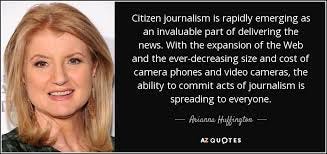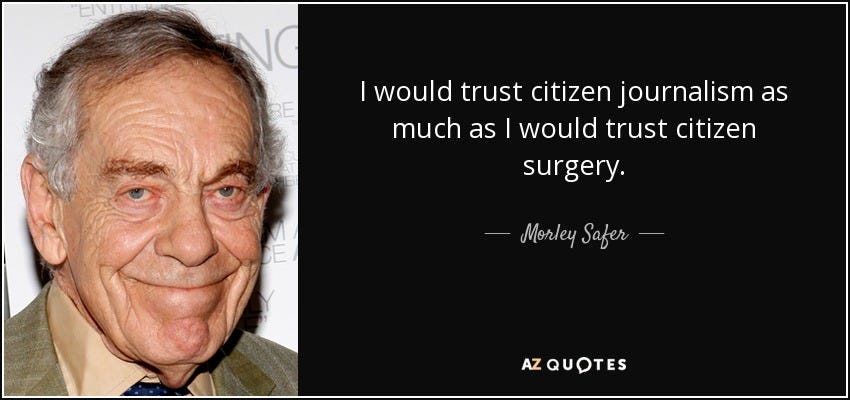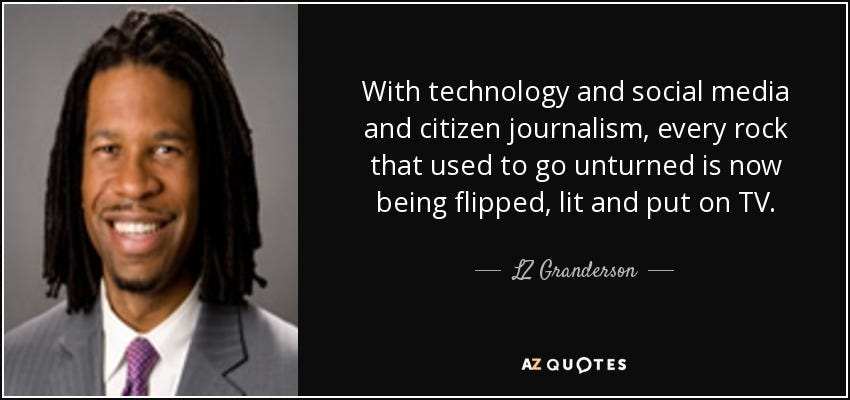The Danger of Citizen Journalism
Christine Merser, June 2, 2025
In 2012, Aaron Sorkin penned the final season of The Newsroom, his last great warning about what was to come in journalism and how it might be the very thing that undoes our democracy. It was brilliant. (Ok, you can skip Season 2, but 1 & 3? Gold.) Season Three is built around the new challenges he saw coming to political journalism. He coined the term citizen journalism, the idea that anyone with a laptop and a platform can present themselves as a journalist, even if what they’re sharing is little more than entertainment, or worse, lies designed to manipulate us.
By definition, political journalism is supposed to be about accurately tracking events, what actually happened, not what someone wishes had happened, or what will get the most clicks. It’s meant to inform the public by laying out the facts of government, policy, and power. And if a journalist includes their point of view, it’s supposed to be labeled as just that, a perspective, not a fact. But when ordinary citizens (like me) can write whatever they want under the protection of the First Amendment and present it as news, we start to blur the line between truth and entertainment. Or worse, between truth and manipulation. Or just plain lies with an evil motivation.
One of the most striking moments in that final season, for me, was when one of the news people, spectacularly played by Olivia Munn, pulls the rug out from under an online media hack, a guy who couldn’t care less about journalistic integrity and measures success solely by clicks and views. She sets him up in an on-air interview and exposes him for what he is. If you’ve never seen it, or even if you have, watch it again. Because it’s exactly where we are now, 24/7.
In addition to this column, I also write a Substack column that is purely memoir-based. It’s about my life, The Voice Inside My Head, which makes it clear it’s my memoir, my reflections about my life, not reporting on the events in politics, or business or anyone else’s life. It’s personal, not political. But this column, the one I started the day Kamala Harris launched her run for the presidency, falls under the category of political journalism. That’s a whole different lane. Political journalism, as I see it, is the kind of writing that sits at the intersection of facts and power, where your job isn’t just to share what factually happened, but to connect the dots, question the motives, and hold those in charge accountable. It’s supposed to inform, not inflame. And with that comes a different kind of responsibility. I have an obligation to vet everything I write here. To make sure it meets the standard my readers deserve if I’m asking for your time and attention.
On Friday, for the first time, I had to pull a piece down. I hadn’t fact-checked it properly. It shames me to write that sentence. And I’m sorry.
I’m not sure if I was set up or not. The story was sent to me late Thursday by two people I know from my town. It called for an action on Friday morning early, so I rushed. I did confirm that my beloved Wiscasset, Maine, my very own Mayberry, is sometimes housing ICE detainees in the local jail. There have been multiple news reports about it over the last few months. The sheriff himself has explained publicly that he’s doing so in accordance with the law.
But the story I shared went further. It claimed that two individuals were detained there this past week. And as best I can tell, that didn’t happen.
I was lucky. I sent a letter about it to the editor of the Boothbay Register, my first time doing so, and the editor wrote back right away. He said they couldn’t confirm the story and asked for my source. The feeling in the pit of my stomach as I read that email and realized I might have been duped, I won’t forget it anytime soon.
I took the post down immediately. I started making calls, trying to understand what had gone wrong and letting those who follow me locally know that they should delete it and not forward it. But the damage was done. I had hurried the truth. And you can’t do that. Not in writing. Not when people trust you. Not when the future of the country might just depend on all of us getting this right.
So again, I apologize. I will not make that mistake again.
And I thank my lucky stars that someone else, an editor doing his job, stopped me from doing more harm than I already had.
But it also raises bigger questions. About the world we now live in. About how fast the rules are changing. About how exhausting it is to keep up. And about how we have to recalibrate the way we approach nearly everything.
There was a time when you could read The New York Times without questioning whether the headline was shaped to avoid backlash, or even lighten your point of view.
There was a time when a neighbor, who you trusted with your children, telling you something meant it was true.
These days, I spend less and less time gathering information from social media. But I do read and post on Threads. Last week, I fact-checked 20 posts in a row from my feed. Six of them were wrong. Three of the six I would’ve believed if I hadn’t checked. The other three were obviously nonsense.
I don’t have time to fact-check everything. None of us do. And now, with AI-generated videos that look and sound real, we can’t even be sure that what we’re seeing is real. You can throw your ‘seeing is believing tee shirt’ out with the dirty bathwater.
So, what do we do?
We choose the bylines we read carefully. We question headlines. A headline that reads, Concern Grows Over Trump’s Acceptance of 747 Gift from Middle East, should raise an eyebrow, not just at the story itself, but at the language. Concern? That’s not concern, that’s outrage. And when headlines soften the severity of what’s happening, we have to ask why. Who benefits from that choice of words?
We have to slow down and decipher what we read with a new sense of questioning.
There was a time when we could turn on the news and believe we weren’t being manipulated. That the goal was to inform us, not push us further into the corner they want us boxed into. But we don’t have that luxury anymore.
I spent the weekend thinking seriously about whether I should keep writing this column. I don’t have the resources to be a proper reporter. But I do believe that my point of view about what is happening in my country mirrors that of many others. And some days, I think I can articulate that point of view in a way that helps push us all toward action. Action that might, just might, help create an America I can be proud of again.
So for now, I’m still in. And I’m starting this week with an apology. Thank you for holding me to the standard I know I should meet.






I am SO GLAD you are STILL IN and take your role as seriously as we take you as a friend and write and really cherish you in our lives. Thank you !
Glad you’re still in and have the integrity to admit when you’ve made a mistake. THANK YOU!